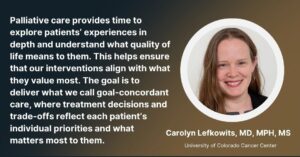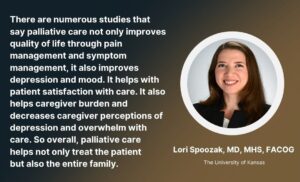Become a Palliative Care Champion
Explore this page to understand the vital role palliative care plays across the cancer care continuum. Find resources and learn how to join their efforts to improve patient outcomes and elevate the standard of care.
 |
 |
I'm looking for

Explore this page to understand the vital role palliative care plays across the cancer care continuum. Find resources and learn how to join their efforts to improve patient outcomes and elevate the standard of care.
 |
 |
Palliative care is specialized medical care for people living with serious illnesses. It focuses on relieving symptoms and reducing the stress associated with these conditions. The primary goal is to improve quality of life for both the patient and their family.

Hear from Jackie Wall, MD, as she shares what it means to be a palliative care champion, and why this role is essential in improving the lives of patients with gynecologic cancers.
Palliative care champions play a vital role across multiple areas of gynecologic oncology, including surgical care, patient and family support, healthcare provider well-being, and overall health system effectiveness.
For Patients and Families:
For Healthcare Providers:
For the Health System:
|
Palliative Care in Surgery Surgical patients have distinct palliative care (PC) needs that require thoughtful integration throughout the surgical journey:
|

Hear from Lori Spoozak, MD, as she explains why palliative care is more essential than ever in today’s gynecologic cancer care.

Palliative Care Module Series Part 1
Five 10–20-minute presentations on different topics with quizzes and case discussion guides—jump around and view the topics you’re most interested in.
Palliative Care Module Series Part 2
Six 10–20-minute presentations on different topics with quizzes—jump around and view the topics you’re most interested in.
High Stakes Communication in Gynecologic Oncology
2-hour session recorded at the SGO 2024 Annual Meeting on Women’s Cancer with slides available to download. View it all at once or in segments.
Indications for Outpatient Palliative Care Consultation: How to Introduce Palliative Care to Patients
50-minute session recorded at the SGO 2023 Annual Meeting on Women’s Cancer with slides available to download. View it all at once or in segments.

Center to Advance Palliative Care